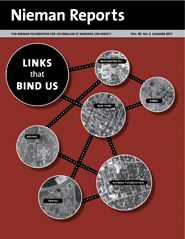![]() Every Friday, Mark Coddington sums up the week’s top stories about the future of news.
Every Friday, Mark Coddington sums up the week’s top stories about the future of news.
The Guardian’s digital leap: The Guardian has long been one of the top newspapers on the web, but this week, the British paper announced a major step in its development as a digital news organization with a transition to a “digital first” operation. So what exactly does that mean? Essentially, that the Guardian will pour more of its resources (especially financial) into its digital operation in an effort to double its digital revenues within the next five years.
![]() Like at many papers, the Guardian’s print side is sagging severely. According to execs, the paper’s parent company could run out of cash in three to five years if things don’t change. As the Press Gazette’s Dominic Ponsford noted, this move indicates that the Guardian doesn’t believe that print decline can be stopped or reversed.
Like at many papers, the Guardian’s print side is sagging severely. According to execs, the paper’s parent company could run out of cash in three to five years if things don’t change. As the Press Gazette’s Dominic Ponsford noted, this move indicates that the Guardian doesn’t believe that print decline can be stopped or reversed.
But at the same time, Guardian execs told paidContent they’re not abandoning print entirely, just reconfiguring it for the digital era. That includes transforming the daily paper into a more analysis-heavy edition that’s meant to be read in the evening. As Yahoo’s Joe Pompeo reported, the transformation also involves forming a newsroom for a new U.S.-based site.
The Guardian’s executives believe this digital transition will be inevitable for newspapers: “All newspapers will ultimately exit print, but we’re putting no timeframe on that,” said Guardian Media Group CEO Andrew Miller. Ponsford said that while this is a watershed moment for the Guardian, it doesn’t necessarily mean the end of print for Britain’s national press. NYU j-prof Jay Rosen saw the Guardian as staking out the open approach to the web, alongside the Times of London’s gated approach and the New York Times’ metered one.
GigaOM’s Mathew Ingram said the Guardian should be given credit for having the guts to draw a line in the sand over its digital future, but Kevin Anderson said this doesn’t change the fact that the Guardian is hemorrhaging cash. An open, digital-first philosophy can’t make money appear, she argued; the Guardian needs to take on its anti-commercial culture and build a sustainable business.
Strengthening local journalism: The FCC released its report on the state of local journalism late last week, and some of the interesting conversation surrounding it bled over into this week. Free Press’ Josh Stearns responded with a thoughtful post about journalism and institutions in which he made the point that the report predominantly addresses structural factors, when journalism’s cultural climate may be more damaging in its ability to keep institutions in check. “The contradiction at the center of the recent FCC report — that citizens have more tools than ever to be watchdogs, but have less power than ever to hold institutions accountable — highlights one of the most troubling aspects of the shifting journalism landscape,” Stearns wrote.
 The study didn’t offer much in the way of solutions (especially government-based ones), largely leaving news organizations to figure out how to combat these problems on their own. Mathew Ingram of GigaOM saw that message as a worthwhile one, while Jessica Clark of PBS MediaShift viewed that as a weakness. Ars Technica’s Matthew Lasar focused on a different aspect of the report: The idea that the Internet has “hamsterized” journalism, forcing reporters to focus on smaller, more time-sensitive stories, rather than larger, more significant ones.
The study didn’t offer much in the way of solutions (especially government-based ones), largely leaving news organizations to figure out how to combat these problems on their own. Mathew Ingram of GigaOM saw that message as a worthwhile one, while Jessica Clark of PBS MediaShift viewed that as a weakness. Ars Technica’s Matthew Lasar focused on a different aspect of the report: The idea that the Internet has “hamsterized” journalism, forcing reporters to focus on smaller, more time-sensitive stories, rather than larger, more significant ones.
Finding space for articles and stories: Another discussion carried over from the past couple of weeks: CUNY j-prof Jeff Jarvis’ post late last month describing the article as “luxury or byproduct” of the journalistic process created a bit of a stir when he published it, and that discussion was renewed this week when French media consultant Frederic Filloux argued against Jarvis’ point, saying instead that articles have become more essential in the age of the tweet: “Articles are more necessary than ever to understand and to correct excesses and mistakes resulting from an ever expanding flurry of instant coverage,” he said.
Jarvis replied that he’s not intending to devalue the article, but to elevate its value to something worthy of serious, focused effort. “Too many articles passing themselves off as professional journalism are crap and I say we can’t afford to do that anymore. I say we should treat articles with veneration as a luxury,” he said. GigaOM’s Mathew Ingram tried to reconcile those two positions in a can’t-we-all-just-get-along post.
Journal Register’s Steve Buttry added to the discussion with a distinction between “story” and “article.” An article is a set of facts usually oriented around the 5 W’s, Buttry said, but a story has narrative arc and is built around plot, character, and setting. One can live on without the other, he argued. “Perhaps the news article and the text narrative will survive in some form in journalism. But if they fade into journalism’s history, storytelling and journalism can still survive and thrive.”
Online community and local news: Within the Nieman Foundation’s Justice League for journalism, there were a couple of cool collections of articles published this week that you’ll probably want to take a look at. The first comes from Nieman Reports, whose summer issue, released this week, focuses on journalism’s role in fostering connections and community online. The issue contains dozens of bright pieces on the subject, including Public Radio International’s Michael Skoler on community as a business model, former NPR ombudsman Alicia Shepard on online comments, Emily Olson of the Register-Citizen on the newsroom cafe, and Kentucky j-prof Al Cross on rural community journalism.
 The other set of posts were here at the Lab, based on an FCC study on the decline of web-based local news. George Washington j-prof Nikki Usher gave a fine summary of the study, emphasizing the small role that local news, whether affiliated with traditional news orgs or not, has in the U.S. online ecosystem.
The other set of posts were here at the Lab, based on an FCC study on the decline of web-based local news. George Washington j-prof Nikki Usher gave a fine summary of the study, emphasizing the small role that local news, whether affiliated with traditional news orgs or not, has in the U.S. online ecosystem.
Before you get too depressed about the study, though, you should check out Lab editor Joshua Benton’s cautionary notes about the findings. Benton also broke the data out by community, giving us some fascinating geographical data to play with. Meanwhile, Mediaite’s Philip Bump posited that people don’t have time for local news because it’s squeezed between the two levels people really care about — the individual and the national.
Reading roundup: After last week’s Applepalooza, it was a relatively slow week this week. Here are a few more of the highlights:
— In our now-weekly look at the world of AOL, the Los Angeles Times’ James Rainey wrote a feature on Patch taking it to task for falling short of its grand local-media aspirations, and GigaOM’s Mathew Ingram said AOL’s profitability plans for Patch are wishful thinking. Street Fight’s Alex Salkever, meanwhile, said Patch’s main problem is bad pay.
— The Journal Register Co.’s John Paton posted the text and slides from a talk detailing his newspaper company’s “Digital First” transformation, with plenty of advice for other local newspapers.
— Several useful sets of tips for journalists: NPR’s Matt Thompson on ways journalists can take advantage of evolving content management systems, Poynter’s Jeff Sonderman on Facebook news publishing from a newly Facebook-only news org, and Amy Gahran’s basic toolkit for online journalistic engagement.
— Pew released a study on online social networks and American life, and it’s sure to have a boatload of interesting data for researchers, news orgs, or anyone else interested in social media.
— Finally, here at the Lab, Brain Pickings editor Maria Popova wrote a smart post looking at Twitter and the rise of curation as a form of authorship. It’s well worth a read.